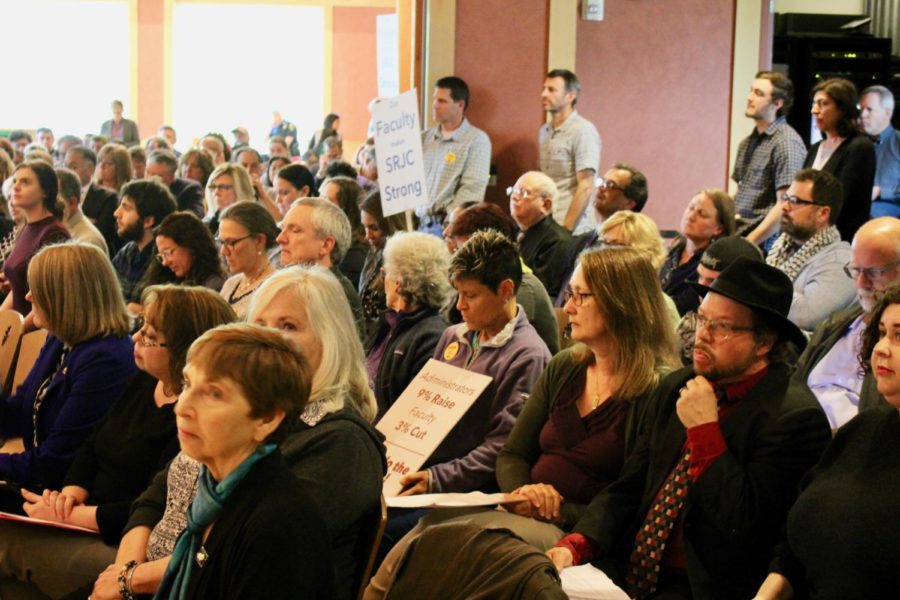Under normal circumstances, The Oak Leaf would not use such profane language. The editors have decided that due to the out-of-the-ordinary nature of political discontent and cultural division at SRJC in 2018, this is an accurate term and not gratuitous. We apologize for any offense caused, but the controversies this semester (and last) merit extreme language.
-The Oak Leaf editors
When a senior administrator announced plans to cut the majority of the summer course load to offset Santa Rosa Junior College’s projected $6.5 million budget deficit March 29, she lit a flame under a campus rife with unrest, sparking a political “firestorm” that threatened to unseat the president of the college.
Tense salary negotiations, the adoption of state curriculum guidelines, boycotts of community events and severe budget concerns created a campus culture in which faculty, students, staff and administrators rarely saw each other as allies.
The controversial decision, announced three days before registration was slated to begin, created an outcry that united the school against the administration. When the fires died down, the hope for a more cohesive campus emerged from the ashes.
The Unkindest Cuts
Senior Vice President Dr. Mary Kay Rudolph announced the cuts in a faculty email late afternoon on a Thursday and left The Oak Leaf and concerned faculty members to inform students.
The article released online by The Oak Leaf that evening immediately became the most viewed and shared article by a factor of at least three, and because the administration provided little information, traffic to the site skyrocketed over the next week.
President Dr. Frank Chong sent out an email to students (not faculty) the next day apologizing and suggesting the decision would be reversed.
Chong said administrators didn’t realize how important summer school was to students who relied on the planned courses to stay on track with educational plans. “I really didn’t understand how important summer school was to our students,” he said.
Other community members questioned how the administration could have made a decision many considered obviously harmful.
Nancy Persons, librarian and vice president of the Academic Senate, called for a vote of no confidence in Chong that weekend.
“I cannot fathom the thinking that led to this terrible decision and its retraction—here we are pressed to help students make their way through our system in a timely manner, but we do this by cancelling the very classes that will enable that goal?” Persons wrote in an all-staff email.
“Over five years or so I have seen a steady erosion in the ability of our senior leadership to manage various challenges effectively. My own faith and trust in our senior leadership to effectively steer this excellent ship we know as SRJC has been destroyed.”
The decision also raised questions about the motives of Rudolph and Senior Vice President of Finance Doug Roberts, who were perceived to have pushed the decision through.
Roberts, a budget hawk, and Rudolph, chief negotiator for the district in strained, months-long salary negotiations, both announced their retirements at the end of the academic year. Some members of the All-Faculty Association (AFA), the faculty union heading up negotiations, suggested the maneuver was a show of political might.
Many faculty members, led by Anne Donegan, social science chair, announced boycotts of planned centennial events to protest the district abandoning a long-held salary-determination method called Rank 10. Moves to cut faculty salaries 3 percent came at a time when the board of trustees raised administrative salaries 9 percent, causing faculty members to seethe.
Chong explained the district must raise administrative salaries to remain competitive when hiring talent. Faculty members countered that the same reasoning applied to instructors, especially when the cost of living in Sonoma County was rising dramatically.
“There is something very wrong at SRJC, and at the center of the problem is President Chong,” Craig Foster, retired English instructor of 27 years, wrote the board of trustees.
“For reasons no one has explained, he chose to take the advice of two vice presidents (both of whom retire at the end of spring semester) rather than consulting academic departments and the Academic Senate in his decision to cancel summer 2018 classes. The vice presidents, with your approval, awarded themselves substantial salary increases before their departure.”
Chong denied that Rudolph and Roberts were behind the move, although he replaced Roberts as budget overseer with Director of Fiscal Services Kate Jolley, and both vice presidents were notably absent in the following weeks.
“They had input, but ultimately I made the decision,” Chong said. “When you are so-called ‘on the top,’ you have to take the heat.”
The embattled president cried mea culpa and began to wax definitive reversal early the next week. Chong fielded angry questions from students for more than an hour April 2 (the first day of summer registration) in an early-morning campus sit in.
After an April 4 meeting with the advisory President’s Consultation Council (PCC) of student, faculty and staff representatives, Chong announced no major changes would be made to the summer schedule.
Still, the Academic Senate passed a resolution declaring no-confidence in Chong, Roberts and Rudolph that afternoon. The Student Government Assembly (SGA) passed a similar measure the following week.
At the April 10 board meeting, board members created a committee to review the administration over the next year and Chong agreed to take a 5-percent pay cut. He also said he would ask top administrators to take a 3-percent pay cut.
“Although there is much talk about shared governance, there is not much listening being experienced and even less action being taken,” Department Chair of Behavioral Sciences Dr. Brenda Flyswithhawks said. “The ultimate betrayals for faculty and staff are when we feel devalued by the district and especially when the board of trustees appears to be oblivious to it all.”
At the time of writing, the college community seems to be moving back towards an embrace of shared governance. While the political climate may have begun to heal after months of increasing tension, the problem the disdained cuts intended to solve, the $6.5 million deficit due to chronically declining enrollment numbers, weighed heavier than ever.
BUDGET CRISIS!
After the board of trustees sanctioned Chong April 10, Jolley, who replaced the embattled Roberts as chief budget overseer the week prior, gave a somber report of SRJC’s budget outlook.
“We’re not hearing that it’s going to get a lot better, but we’re not hearing that it’s going to get worse,” Jolley said.
Increasing cost of living, aging demographics and an economy offering ample work opportunities have driven an eight-year decrease in enrollment.
SRJC receives funding from the state based on the number of full-time equivalent students (FTES), or students who take 12 units each semester. Since 2011, the number of FTES has hovered just below the 20,000 mark that would designate SRJC a “large college” rather than a “medium college,” with huge budget implications.
The college lost $1.2 million from this decrease last year alone, Jolley said.
The AFA has questioned the administration’s management of the budget, citing a $10 million discrepancy in emails Chong sent over two weeks.
Chong said the college’s attempts to increase enrollment over the last 4 years have failed, and $6.5 million is not pocket change.
Painful cuts are likely in the college’s near future. Will the community weather the coming storm together, or will divisiveness, deceit and distrust exacerbate an already grave problem?
Additional reporting by Rachel Edelstein, Kevin Johnson, Dylan Kerzin and Seamus Reed.






Jen • Apr 18, 2018 at 6:50 pm
Close the Petaluma campus. Sell it. Get rid of it. It is not accessible to all anyway